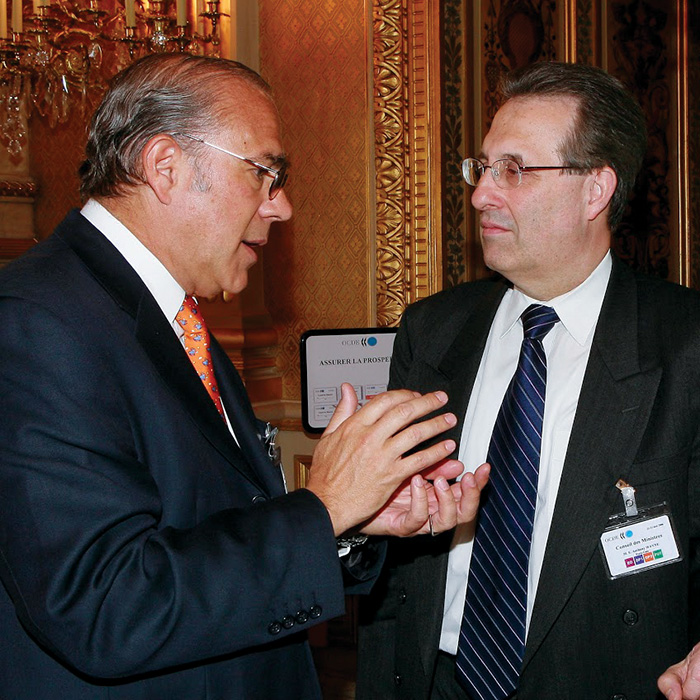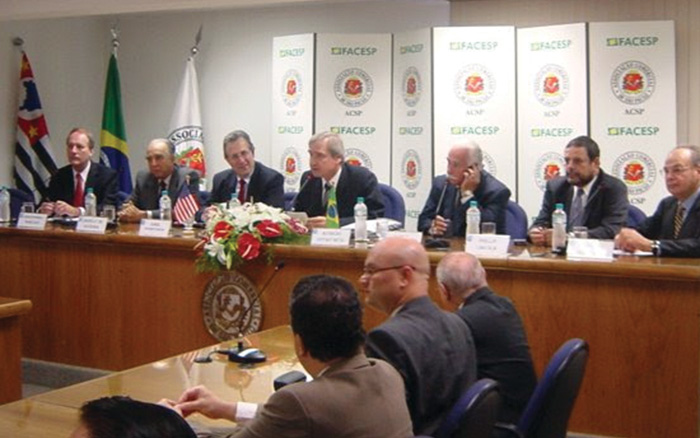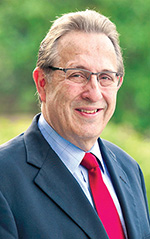What Is Economic Diplomacy and How Does It Work?
The U.S. Foreign Service is at the forefront of crafting policy and carrying out economic diplomacy to advance the strategic and security interests of the United States.
BY TONY WAYNE

FSO Tony Wayne, at right, speaks with OECD Secretary General Angel Gurria about efforts to enhance the antibribery convention and other topics on the agenda at the May 2006 OECD ministerial meeting.
Courtesy of Tony Wayne
Economic statecraft and economic diplomacy involve using diplomatic skills with economic tools to advance a country’s economic, political and strategic goals. The overarching economic statecraft and the day-to-day economic diplomacy are enormously important parts of the United States’ international policy. Getting this right can provide a huge boost, just as getting it wrong can be very costly.
Economic statecraft and diplomacy are much broader than support for sales from U.S. farms and businesses overseas or support for the investments Americans make in other countries, as important as that work is for America’s prosperity. They include the use of economic sanctions to punish or deter bad actors in the world, ranging from terrorist financiers and drug smugglers to corrupt officials. They involve mobilizing international assistance and financing for partner countries emerging from conflicts or natural disasters. They involve building support to set and enforce international rules and norms so that corruption and bribery are less acceptable, for example, or to make trade in “conflict diamonds” and other smuggled minerals more difficult, or to facilitate international air transportation or telecommunications (think internet and cell phone) connectivity.
Economic statecraft forges policies to decide which countries merit U.S. financial and development assistance, how much and under what conditions. Then U.S. economic diplomacy negotiates agreements with host governments for effective use of that aid and, very importantly, works to assure effective implementation of aid and reform programs.
Economic diplomacy includes building international coalitions to help countries recover from financial crises. It entails convincing host-government leaders to apply the policies and measures most likely to strengthen their economies and provide jobs for their people, even if the reforms have political costs.
Economic statecraft and diplomacy are much broader than support for sales from U.S. farms and businesses overseas or support for the investments Americans make in other countries.
In all these areas, the U.S. Foreign Service is at the forefront of crafting policy and carrying out economic diplomacy for the good of the United States. The Foreign Service, and our Civil Service colleagues in the foreign affairs agencies, work with partners at Treasury, Commerce, the Office of the U.S. Trade Representative, Defense and other agencies to develop, implement and hone these approaches. In Washington, D.C., as well as overseas, Foreign Service officers are essential players in creating strategies, in winning agreement from partners and building international coalitions, and in implementing policies and programs to achieve good outcomes in other countries and regions. The Foreign Service brings unparalleled international knowledge and experience to the table in Washington that regularly help focus, refine and implement U.S. policies.
The United States has long practiced economic statecraft to open markets for U.S. goods and services and to boost global prosperity and stability, but over the last two decades increasing attention has been given to the added sway gained by using economic tools and diplomacy in a systematic, strategic way to support partners, to change or punish harmful behavior and to win support for U.S. international priorities. This is even more essential in a world where economic competition is increasingly fierce and not always fair, and where other governments may have much more influence in economic areas than they have in the military or other spheres. China’s growing international clout and its aggressive economic diplomacy is one example that highlights the urgent need for effective, multipronged economic statecraft by the United States.
In this issue of The Foreign Service Journal, you will find outstanding examples of U.S. Foreign Service officers carrying out economic diplomacy as part of America’s broader foreign policy. I have seen this work flourish firsthand in Mexico, Europe, Afghanistan and Argentina. The emblematic cases that follow, drawn from my time as assistant secretary for the Bureau of Economic and Business Affairs (EB) from 2000 to 2006, illustrate the importance of Foreign Service networks and partnerships in Washington, D.C., and overseas.
The Problem of Terrorist Financing
On Sept. 11, 2001, I was traveling with Secretary of State Colin Powell in Lima, Peru, where, among other objectives, we were exploring with Peru’s president how the United States could use its economic tools to support that newly re-emerged democracy. This mission was disrupted by that day’s terrorist attacks. On the flight home and then with my colleagues in EB, we searched for ways the economic team at State could help define and build a strong international response to that attack.
Previously several of us had worked to hone and strengthen the use of international economic sanctions as a tool of diplomacy, including working through differences with European partners. We had learned that a sanction approved by the United Nations Security Council under Chapter VII of the U.N. Charter had the force of law in many other countries. We suggested pursuing a U.N. Security Council resolution focused on sanctioning financial and other support for terrorism as an initial step.
With approval from State Department leadership and the White House, we partnered with the Bureau of International Organization Affairs and the U.S. Mission to the U.N. to write and present a draft resolution; within a few days, the U.N. Security Council passed Resolution 1373. It was to become the “go to” international framework for stifling terrorist financing.
Economic officers have worked hard to ensure that the international growth of the internet and high tech supports America’s economic interests, as well as its commitment to the free flow of information.
However, passing that resolution was just the start. We in EB partnered with the National Security Council, Treasury and the intelligence and law enforcement communities to craft a U.S. executive order along the same lines. Then, with partners in other State Department bureaus and in embassies around the world, we set out to build an international coalition to implement the U.N. resolution. We worked to persuade governments to change their own laws and practices to outlaw terrorist financing, to freeze assets and to build international partnerships so that even initially hesitant governments were willing to join the United States in “designating” individuals, nongovernmental organizations (NGOs), charities and banks who were helping fund terrorism.
This was a long, hard process. In Washington, we had to forge interagency agreement on targets and tactics. Then our embassy teams had to persuade host governments to join in the effort. The debates in Washington were often intense, but Foreign Service expertise helped win interagency consensus on how to most effectively build an international coalition and win support in every part of the world.
At State, as part of the process, EB hosted weekly interagency meetings that included all geographic bureaus to define the way forward and to coordinate work among embassies. In the months and years that followed, the United States rallied many countries to join the effort. They designated scores of entities for sanctions, froze more than a hundred million dollars in funds and assets, and made it much harder for others to fund terrorists. Each freeze was implemented globally within 48 hours. In a December 2005 report, the 9/11 Public Discourse Project, an NGO formed by some members of the 9/11 Commission to ensure implementation of the commission’s recommendations, identified the EB-led effort against terrorist financing as the most effective anti-terrorist work to date (giving it a grade of A-). Much of that success was fueled and steered by Foreign Service officers.
Support for Economic Reform, Reconstruction and Rebuilding

At a meeting of the Brazil Chamber of Commerce in São Paulo in April 2006, FSO Tony Wayne, third from left, encourages more U.S.-Brazil trade and commerce.
Courtesy of Tony Wayne
Interestingly, the second highest score given by that same 2005 report on 9/11 recommendations was a “B+” for policies supporting economic reform in the regions of concern. In the fall of 2001, as EB began to work on blocking terrorist financing, it also began a concerted effort to develop initial economic support and reform packages for countries from Turkey to Pakistan that would be affected by the repercussions of the 9/11 attacks. In this EB worked closely with the relevant State geographic bureaus, as well as with USAID, Treasury, USTR, the NSC and, eventually, the international finance institutions.
One priority focus was Afghanistan, thinking through and building international support for economic and other nonmilitary assistance for that country following the initial military actions against the Taliban regime and al-Qaida. EB stepped into the breach to lead efforts to organize three international donor conferences focused on Afghanistan. In coordination with State regional bureaus, the EB team worked with the U.N. Development Program and the World Bank, as well as with Japan, the European Union and the Persian Gulf countries.
This was an intensive effort. For weeks during the run-up to the first Tokyo donors conference on Afghanistan, for example, we held twice-daily phone calls with the Japanese and other key sponsors to develop what became an internationally agreed-upon framework for assistance needs, to rally initial aid pledges and to achieve the return of Afghan assets from around the world to help the fledgling government in Kabul. The initial conferences were considered a success, and the focus shifted correctly to work on the ground in Afghanistan.
The Afghanistan conferences were precursors to subsequent, equally intense international reconstruction efforts led out of EB to help revive Iraq’s economy after toppling Saddam Hussein, to rebuild severely damaged parts of Southeast and South Asia after the 2004 tsunami and to support recovery from the terrible 2005 earthquake in Pakistan. In each of these cases, the economic teams at State, USAID and at our embassies around the world were essential in constructing international coalitions and mobilizing many billions of dollars in aid to help key partners. These efforts all included the nitty-gritty work of interagency decision-making in Washington; initiating frequent outreach to other governments, NGOs and businesses to build agreement; organizing successful gatherings overseas; and beginning the complex work of delivering aid, as well as trying to encourage best practices in recipient countries. This was economic diplomacy in vigorous action, with the Foreign Service front and center.
The debates in Washington were often intense, but Foreign Service expertise helped win interagency consensus on how to most effectively build an international coalition to staunch terrorist financing.
A Vast Array of Economic Diplomacy Issues
Beyond these striking examples, the EB team used its partnerships among State, U.S. embassies and U.S. agency colleagues daily across a host of issues during these years. This work included helping to ensure U.S. and global energy security via sufficient oil production in the Persian Gulf; the development of new oil deposits in the Caspian region, Africa and elsewhere; and helping bring renewable and other alternative energy sources into play for the European Union and others. The work involved organizing demarches by our embassies to change specific unfair practices vis-á-vis U.S. intellectual property in economies around the world, from Canada to Taiwan to Argentina. The work included building a new model for development assistance with the creation of the Millennium Challenge Corporation and a consensus on new development strategies among the Group of 8 countries. It entailed helping to engineer effective debt relief in Africa, for example, and getting our closest European partners to implement their anti-bribery commitments to level the field for U.S. companies and to reinforce good governance.
These efforts also included vastly expanding the number of Open Skies agreements around the world to support travel and tourism. Economic officers have worked hard to ensure that the international growth of the internet and high tech supports America’s economic interests as well as its commitment to the free flow of information. Also important was the invaluable work done to support many trade negotiations, specific commercial disputes and important sales opportunities for U.S. companies in different countries. In scores of instances, Foreign Service officers in Washington and overseas were essential to achieving good outcomes. And this vital work continues.
The United States needs well-crafted and skillfully implemented economic statecraft for its prosperity and security. It needs effective day-to-day economic diplomacy by its Foreign Service officers to ensure that America’s statecraft achieves the best for our country.





